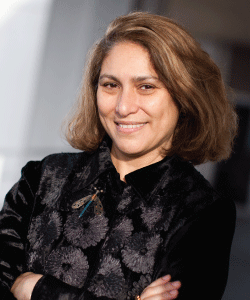Observation
Mahzarin R. Banaji Elected to American Philosophical Society

APS Past President Mahzarin R. Banaji (Harvard University) has been elected to the American Philosophical Society for her revolutionary work on implicit social cognition. Banaji is among 34 individuals recognized by the society this year for their extraordinary accomplishments across the sciences, humanities, and civil or cultural life.
Banaji, an APS William James Fellow, studies how our implicit, or unconscious, mental systems influence social attitudes and beliefs, particularly in relation to in-group/out-group behavior. In 2018, Banaji, alongside APS William James Fellow Anthony Greenwald and APS Fellow Brian Nosek, received the Golden Goose Award in recognition of the societal benefit provided by their research on implicit bias and decision-making. Building on Banaji’s research on memory dating back to the 1980s, the researchers have pioneered the use of the Implicit Association Test (IAT) to measure the strength of associations between concepts (e.g., black, elderly) and attributes (e.g., good, bad) or stereotypes (e.g., athletic, clumsy) that may exist below conscious awareness. She served as APS President in 2010-2011.
In addition to its application to studies of racial inequality, sexism, and other category-based biases, the IAT also shows promise as a tool for assessing individuals’ risk of attempting suicide and advancing psychological scientists’ understanding of romantic attachment, political preferences, and other attitudes.
In her Fred Kavli Keynote Address at the 2014 APS Convention in San Francisco, “Group Love: How the Mind Creates ‘Us’ and ‘Them,’” Banaji highlighted how these unconscious processes contribute to our tendency to divide ourselves into groups. During Inside the Psychologist’s Studio with Mahzarin R. Banaji, filmed at the 2011 APS Annual Convention in Washington, DC, Banaji provided further insights from her research on infant social development, the relationship between brain development and autism, and moral decision-making.
The American Philosophical Society was founded by Benjamin Franklin in 1743 with the goal of “promoting useful knowledge.” Since then, it has elected 5,715 members, 1,051 of whom are active today and 260 of whom have received the Nobel Prize. The organization supports interdisciplinary research and discovery in the public interest.
Other APS Fellows elected to American Philosophical Society include APS Past President Susan T. Fiske (2014), for her research on the cognitive and emotional basis of stereotypes and prejudice; APS William James Fellow Shelley Taylor (2018), for her research on the adaptive nature of positive illusions in the face adversity; and Gerd Gigerenzer (2016), for his work on understanding risks and uncertainties in decision-making.





APS regularly opens certain online articles for discussion on our website. Effective February 2021, you must be a logged-in APS member to post comments. By posting a comment, you agree to our Community Guidelines and the display of your profile information, including your name and affiliation. Any opinions, findings, conclusions, or recommendations present in article comments are those of the writers and do not necessarily reflect the views of APS or the article’s author. For more information, please see our Community Guidelines.
Please login with your APS account to comment.